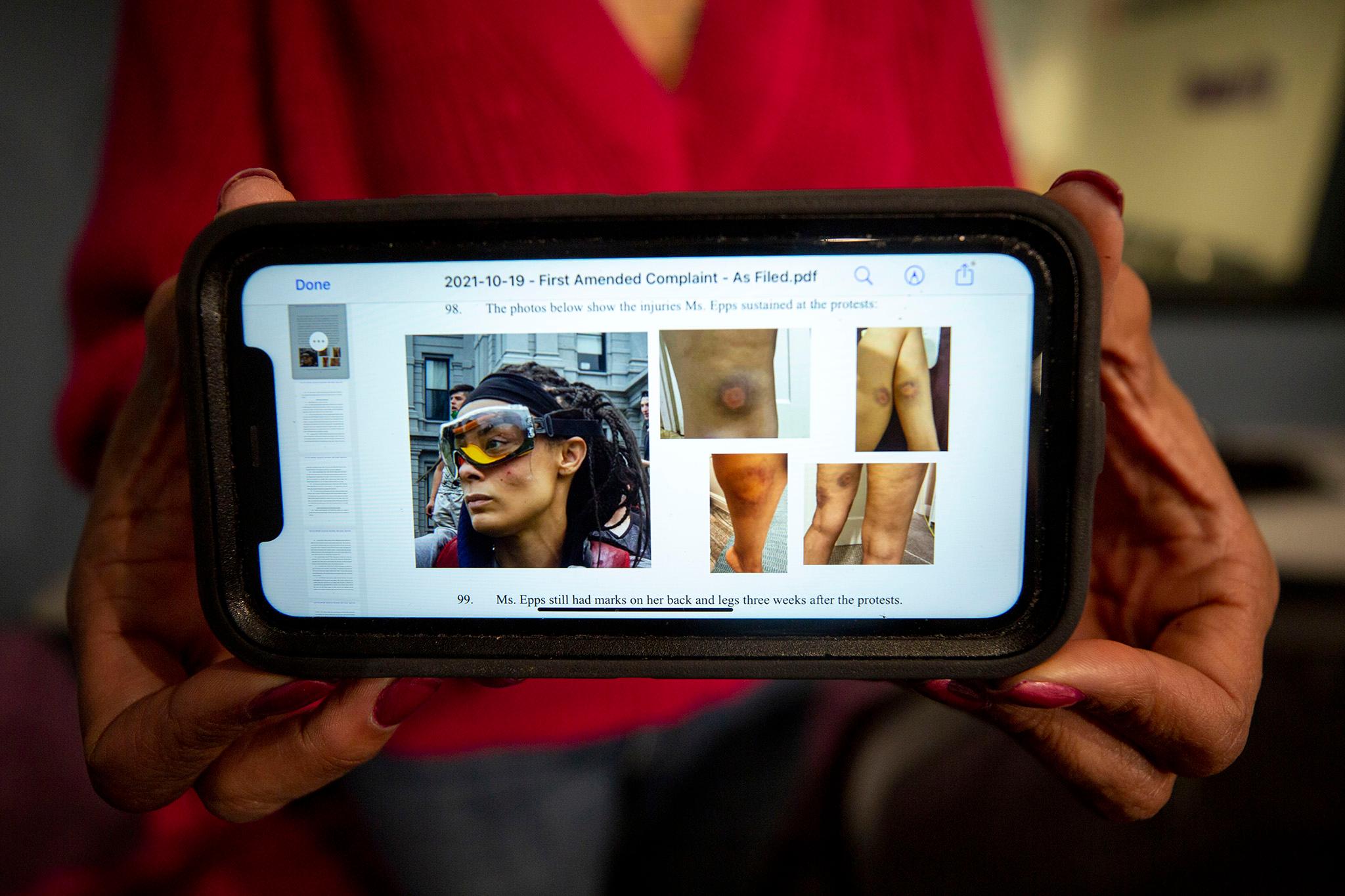
Two years ago, Joe Deras, 31, was protesting the violent death of George Floyd, which occurred in Minneapolis. He was in the line of fire outside the State Capitol building in Denver when police threw a flashbang grenade into the crowd, injuring his eardrum. He almost lost consciousness and could hardly see.
Elisabeth Epps, 42, was out protesting, too. She was shot with a pepperball. She tried to get away, but at one point she couldn’t breathe, and couldn’t find the inhaler she uses for asthma. She had eye pain for two weeks.
Phillip Lopez, 44, had just moved from Pueblo to Denver a month before George Floyd was murdered. He decided to go out, protesting on Broadway and 14th. He had his hands up, and he was down on his knees, when he got hit in the knee with a projectile from a 40 mm launcher. Larger than a pepperball, it cut his knee and left a scar that’s still there. He hasn’t been able to work – he used to manage a Jiffy Lube – because of the trauma.
With 10 other people, Epps and Deras were plaintiffs who sued the city and county of Denver in US District Court right after the protests. Last month, they won a $14 million jury verdict – the first of its kind in the country.
Now, as they await the city’s appeal, another lawsuit is pending: Phillip Lopez heard about the successful lawsuit that Epps and Deras were a part of. He contacted their lawyer, and now is part of another lawsuit, also with a dozen plaintiffs – this one against the City and County of Denver, and also against Patrick Phelan, a former special operations commander with the Denver Police Department.
City officials aren’t accepting the verdict, and have vowed to appeal. Both the Denver Police Department and the Office of the City Attorney have declined to comment on pending litigation.
This is the first case stemming from the George Floyd protests to reach a jury verdict, according to Mark Silverstein, Legal Director of the ACLU of Colorado.
“Our case was the first one challenging the police misconduct that occurred at these protests, to get a jury trial and get to a jury verdict… It’s really unusual and rare in federal court litigation for a case to get to a fully completed jury trial less than two years after the events,” Silverstein said. “And it’s really unusual in this case to have a jury verdict so soon before the statute of limitations has even elapsed.”
As they wait to see what will happen in each of their individual cases, Deras, Epps and Lopez visited a studio at CPR to describe what happened to them on the streets as they sought justice for Floyd, who was murdered two years ago today. They went into the studio as strangers and came out as allies in a shared experience, vividly recalling what they went through that made them seek out lawyers for the damages they faced while standing up for what they believed.
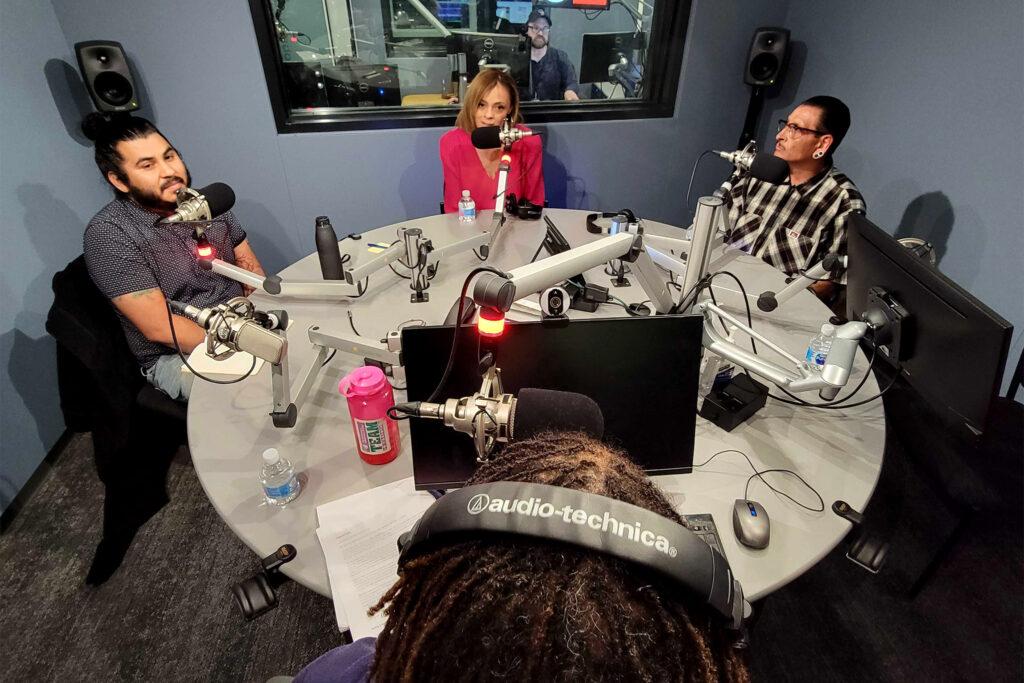
After they shared stories, tears, advice and their pain with each other, they came out knowing what they had in common: despite still experiencing both mental and physical residual anguish and pain stemming from their protests two years ago, they all are proud of taking a stand.
And each of them said, without a second of hesitation, that, despite the lasting scars, they would go out and do it all over again.
Lopez arrived dressed in glasses, dark pants and a button-up shirt, looking excited for the opportunity to share what he had been through with people who could understand.
He recalled what got him out to a protest: “I was probably here about a month and I heard all the protests was happening and stuff like that,” Lopez said.
Growing up in Pueblo, he said, “I've been through a lot with the police and everything, and I felt it was my time to speak and stand up for my people, my friends, and everybody from my hometown.”
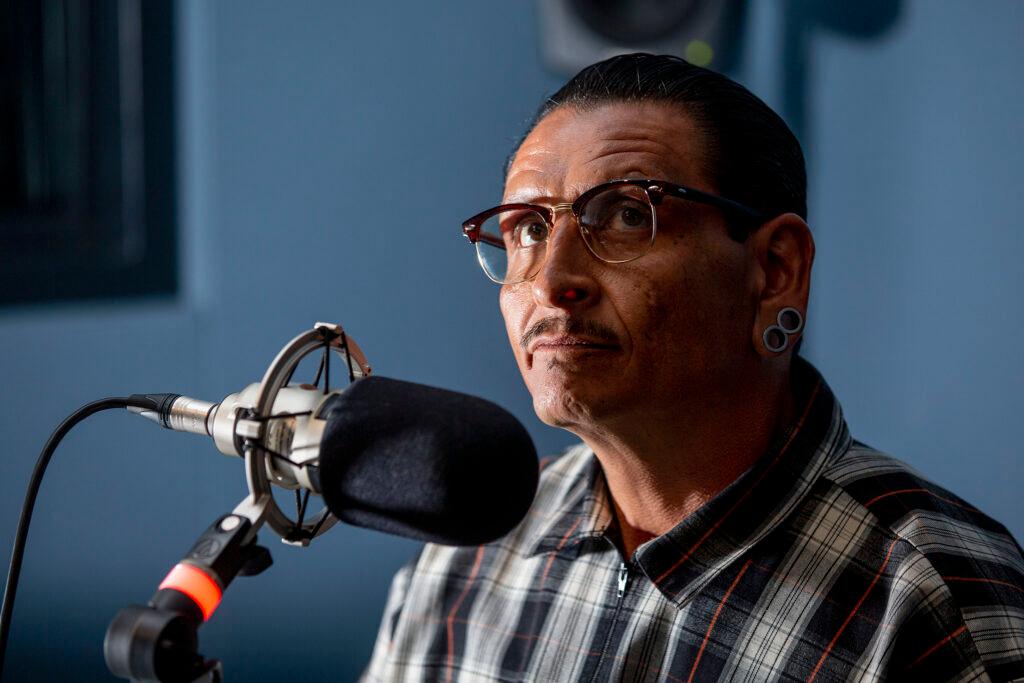
He felt a particular affinity to Floyd because he and his peers felt like they had been mistreated by police many times.
“Just on the regular: get pulled out the car, put on our faces and all that kind of stuff,” Lopez said.
Those police interactions were not a deterrent to his protesting George Floyd’s murder, he said; quite the contrary. “Actually, that motivated me to do it more!” he said. “Now that I'm an adult and I know how to speak for myself and stuff like that, it made me want to be there.”
After getting hurt on his leg, he feels fearful of police when he sees them now, and relies on breathing exercises he learned as a kid when PTSD symptoms flare up, he said.
Deras and Epps were two of the one dozen plaintiffs in the first lawsuit, and they both say that their mental health took a hit that hasn’t been assuaged by the unprecedented jury verdict, in which Deras was awarded $1 million. Epps got $1.25 million. The total award was for $14 million.
Epps received more than the other plaintiffs, most of whom were awarded either $750,000 or $1 million, because she identified an officer who fired a pepper ball at her, and won a judgment against him, in addition to the judgment against the city.
Epps is recognizable to police. From 2016 until 2020, she was a member of a committee that helped rewrite DPD’s Use of Force policy. Former Denver Police Chief Robert White had asked Epps to join; she’d been meeting twice weekly to edit the language and discuss factors officers needed to consider when force might be necessary.
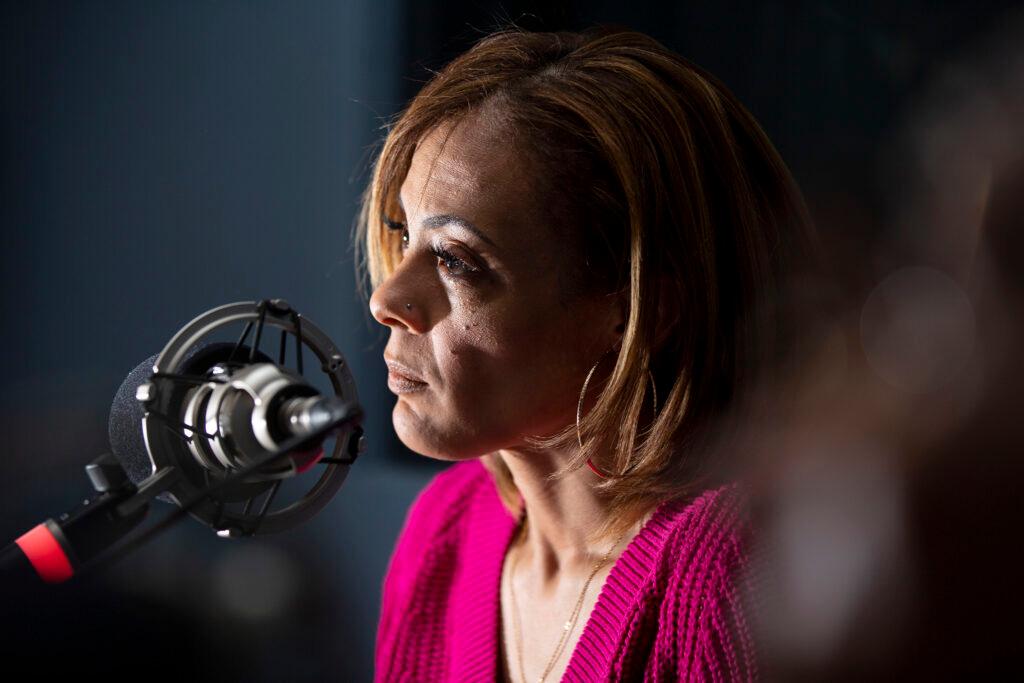
She thinks that while working on the policy, she became a recognizable face that a police officer deliberately targeted when she got shot with a pepperball on Friday, May 29 at about 9 p.m., while filming the police and protest activity as she crossed 14th Street near the Capitol.
“There's two options – only one of two things can be true. Either the officers knew who I was and targeted me, or they didn't, right? And targeted whoever I was without knowing my identity. And both of those options is equally scary to me. That you saw me and you picked me out to target – that's terrifying, right? Or, I'm just any old community member and my identity didn't protect me in any way. And that's equally terrifying.”
She attended most days of the trial, which lasted about three weeks. The verdict came in April after four hours of deliberations by a mostly white jury of two men and six women.
Sitting through it wasn’t easy for Joe Deras either, he recalled.
“It was one of those situations that I just could not prepare for,” Deras said.
“This trial has literally made me sick to my stomach. During the trial, there was many times where I had to leave the courtroom to get some air. I have thrown up more times than I can count in the last month and a half, two months – since the trial – than any other time in my life,” she said, her eyes filling up with tears.
He said there were many contradictions between what police did and what they claimed to have done. For example, he said that officers who he had seen behaving aggressively claimed at trial to have feared for their lives. “I think it was just really hard to sit through those two weeks, three weeks and listen to these things and see the things that we went through back in 2020 and relive them.” He added: “I don't think that I had prepared, and I don't think that I had done the healing.” He is working with a therapist, but still struggles. “I'm feeling like I need a lot more mental health support at this point. And so it's just, it's been a really tough road.”
Deras sat next to Epps during the discussion, while the two lawyers who also showed up sat silently in the recording studio. He recalled being highly motivated to get to a protest. He grew up in Aurora, and remembered seeing police breaking up families when they arrested people for minor drug offenses.
“It wasn't even a question of whether I needed to be out there,” he said during the discussion, as his new friends Lopez and Epps nodded enthusiastically. “Seeing how callously George Floyd was murdered, it really drove me to be out there and say, ‘This is not the world we want to live in.’”
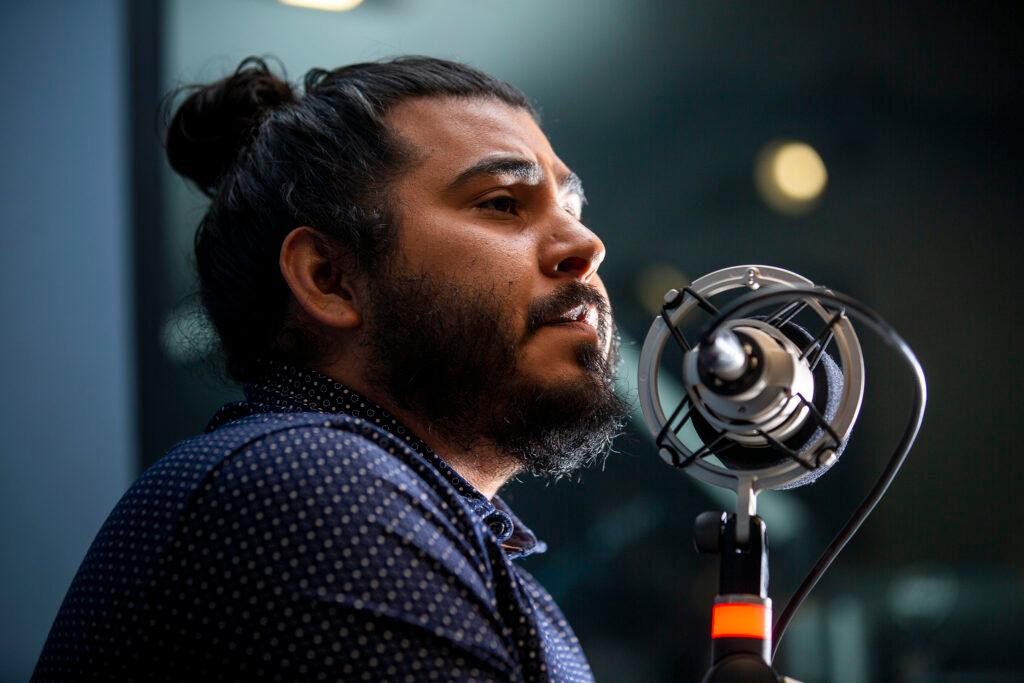
The Director of New Growth and Capacity Building with the Colorado Education Association, Deras was there with a co-worker, another plaintiff in the case who was awarded $1 million. Now, two years later, he was emotional thinking back to one of the worst days, when the police were kettling, or corralling, people.
“We were stuck in an alleyway while they were throwing smoke bombs, tear gas, shooting at us with pepper balls. I remember hearing screams of people who were falling because there was just no way to get out of it,” he said. “And people were stepping on them. There was a real risk of a stampede and people actually being seriously hurt. It was horrendous.”
He added that the police, according to his memory, were not trying to calm things. “I think about those four days, every time there was a serious escalation of violence, it felt like it was the police instigating it.”
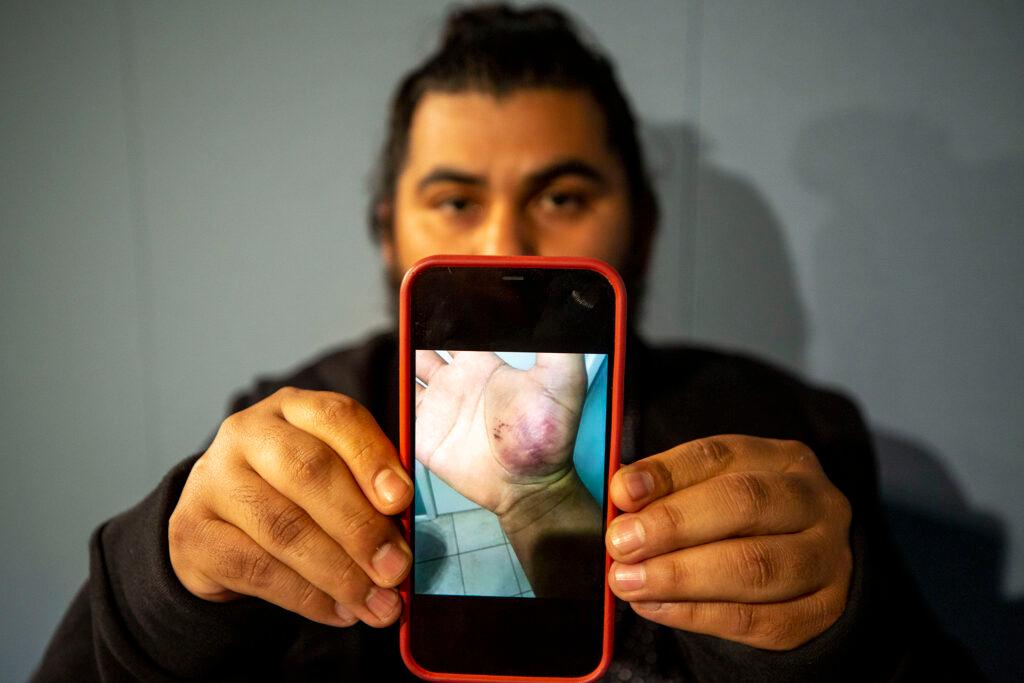
Denver Police declined to respond to questions out of the interviews, but have acknowledged that mistakes were made and that training and tactics have changed since the protests. For one thing, they will no longer use the 40 mm launchers that shot sponges into the crowd, and training on crowd control has been increased.
For Deras, nothing that he experienced while protesting would keep him from doing it again.
“I think back almost a decade ago when Trayvon Martin was murdered by a vigilante in Florida. I had made the decision back then that this was going to be my life's work – social change and racial justice,” Deras said. “And there's just no way that I would not go back. I would. Especially after experiencing everything I did those four days. It just proves why we need to be out there.”
He’s not thrilled with the city’s intention to contest the jury’s award.
“We've gone through this trial, right? And the city has made a lot of claims about what the protestors were doing. And a jury found that they were wrong. . . the city was unable to prove the claims that they've made. I feel a little discouraged hearing Michael Hancock, our mayor, talk about how he is going to appeal this decision,” Deras said. “And it doesn't seem like there has been any kind of accountability or a recognition of responsibility from the city. It doesn't leave much to be inspired by. I think we've shown that the city was wrong, and that's why a jury decided that we should be awarded our judgment.”
His perception of police has also worsened. Like his new ally Phillip Lopez, Deras also has anxiety around police officers. “I was listening earlier [to Lopez] and I also get a lot of anxiety when I see police officers on the street, when I think a police officer might be approaching me. I didn't have such a great perception of police officers before, but I think the feeling has changed from distrust to actual fear.”
This month marks not only the two-year anniversary of the murder of George Floyd in Minnesota, but also the guilty plea of Thomas Lane, one of three additional officers present when Derek Chauvin murdered Floyd. The former Minneapolis Police officer, accused of holding down George Floyd’s legs, pleaded guilty to second-degree manslaughter last Wednesday as part of a plea deal, and faces three years in prison when he is sentenced in September.
Lane’s guilty plea comes a week after a comprehensive biography was published about George Floyd. His Name Is George Floyd, a deep dive into the structural racism that brought Floyd to where he was in his life, was published May 17, authored by two Washington Post reporters.
When asked what George Floyd might think of them, Joe Deras, who has resumed his job at the education association, said: “I would hope that if George Floyd is looking down, that he would see some sort of progress coming out of this. I feel a little sad because I can't say that there's been a lot of progress, but I would hope that our struggle after his death has moved the needle at least a little bit.”
Adds Phillip Lopez: “I think anybody from the streets would be proud to have us out there speaking for [them] out there. If they can't do it, I'm proud to be there for the ones that can't and I will do it again. Most definitely.”









